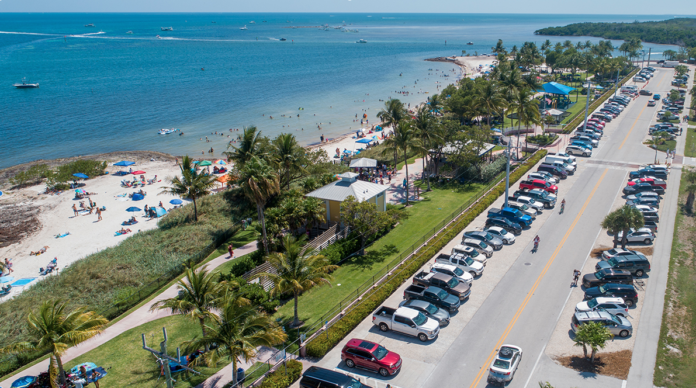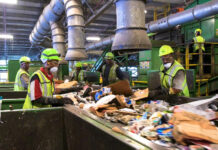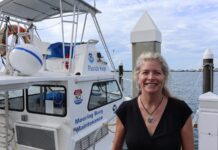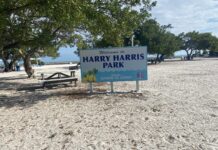
High levels of bacteria found in nearshore waters off several Keys beaches during water quality tests throughout the month of March have significantly subsided, according to new samples collected on March 30.
Conducted by the Florida Department of Health in Monroe County, the routine biweekly tests look for the presence of enteric bacteria (enterococci) in the waters off 11 Keys beaches. Typically inhabiting the intestinal tract of humans and animals, the presence of enteric bacteria generally indicates fecal pollution caused by a variety of potential factors including runoff, pets, wildlife and human sewage. When present in high numbers, the bacteria have the potential to cause infections, rashes and other diseases in humans.
The U.S. EPA’s recommended standards classify water containing 0-35 enterococcus bacteria per 100 milliliters of water as “good,” 36-70 as “moderate” and 71 or greater as “poor.” Though a “poor” water quality test may not close a beach, the department issues an advisory for potential health risks in areas with water in the “poor” range.
During the March 16 tests, five Keys beaches tested with “poor” water quality, triggering or continuing warnings at Key Largo’s Harry Harris County Park (150), Islamorada’s Founders Park (124), Big Pine Key’s Bahia Honda Oceanside (87) and Key West’s South Beach (99).
Marathon’s Sombrero Beach, with a count of 1184 – more than 16 times the threshold for “poor” water quality, and nearly eight times higher than any other Keys beach – drew the ire of local residents on social media, with some suggesting that overuse of Marathon’s beaches and Boot Key Harbor were to blame for the high bacterial counts. Sombrero’s water earned a “moderate” rating on Feb. 1 and progressed to “poor” ratings during the Feb. 15 and March 1 tests. Other than a single test in October 2021, it was the first time the beach had earned a “poor” rating since July 2020.
The story was largely the same at other beaches, several of which were labeled as “poor” throughout March.
But just two weeks later, tests on March 30 revealed “good” water quality at 10 of 11 Keys beaches, including all five previously labeled as “poor.” Five of the 11 beaches tested with a bacterial count of 1, including Sombrero Beach. Only Smathers Beach in Key West (42) earned a “moderate” rating.
James Rachal is the environmental manager for the DOH in Monroe County. While he said the bacterial counts like Sombrero’s made him do “a double take,” he would be far more concerned if other Keys beaches hadn’t had elevated counts all at the same time. He noted that the simultaneous decline in water quality for Upper Keys beaches, which typically yield cleaner samples, is an indicator that environmental factors throughout the island chain might be at play.
“It would be more typical this time of year, just because you have more opportunities when the water is warming up, which is conducive to bacterial growth,” said Rachal. “At this time last year, I didn’t see any of these kinds of numbers. … But there’s no way to say that it wasn’t birds, that it wasn’t entirely natural, or that it wasn’t a boat that just happened to dump.”
Cold and windy stretches, as well as heavy human traffic in the water, may stir up sediment on the seafloor where bacteria live and multiply. Rachal says this turbid water may yield high counts, but so could several other chance events, including something as simple as a flock of birds vacating the area before a sampling team’s arrival.
“We try to be very pristine and collect our sample with good clear water if it’s there,” Rachal said. “But as far as what happened before we got there, we can’t say. You’ll have people that have all kinds of theories, and I have theories too, but nothing I can officially point my finger at. There’s just no way to pinpoint it.”
For updated water quality test results, visit www.tinyurl.com/monroebeaches.




















